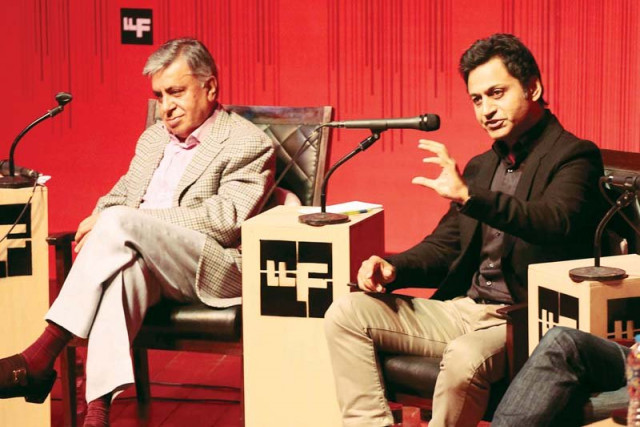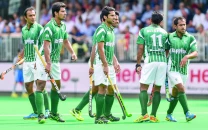For the love of journalism
Panellists opine on broadcast media’s ‘self destruct mode’.

Panellists opine on broadcast media’s ‘self destruct mode’ .
Confessions and accusations surrounding challenges and opportunities for broadcast journalism in Pakistan triggered a passionate debate featuring local and international media experts at the session Future of TV News: Journalism or Mirch Masala?
The session was moderated by Fasih Ahmed, editor of Newsweek Pakistan. Arif Nizami, editor of Pakistan Today, Fahd Husain, executive director of news at the Express News, Munizae Jahangir, broadcast journalist, and Saad Mohseni, chairman of a private media company in Afghanistan, were the panellists.
Nizami said, “If you add too much mirch masala to food, it loses taste.” That is the predicament of Pakistani media, he said.
Nizami cited examples of the strong hold of the establishment and airing Muttahida Qaumi Movement chief Altaf Hussain’s speeches on news channels, as telling of the self-censorship exercised in the media. It is because of lack of proper gate-keeping in broadcast media, that TV had become more ratings-oriented, he said. “Broadcast media has fewer journalists than performers... and we are all guilty of dumbing it down.”
Ahmed interjected that covering Altaf Hussain sometimes fell more in the category of entertainment, drawing appreciative laughter from the audience.
With the government as the largest advertiser in the industry, Ahmed pointed towards links between advertising and its influence on independent media. “If this is the case, I fail to understand how media can ever be free in this country.”
Amid much criticism meted out to broadcast media, Fahd Hussain said while a lot was wrong with broadcast media there was also a lot that was right.
“[Broadcast media] is changing Pakistan, our lives, the way we look at ourselves and our society. We fail, we stumble….but we are headed in the right direction.”
Commenting on his experience with broadcast, he said journalists worked under tremendous pressure and had to maintain a delicate balance. “We push the boundaries every day... we are moving ahead.”
Hussain pointed at advertisers, rather than the government, as the biggest challenge to independent broadcast journalism.
In the aftermath of three attacks on Express Media Group and its staff, Hussain said, journalists had to take precautions themselves to ensure security.
Mohseni was of the view that media played the role of facilitating change in society. It informs and entertains people and has become a focal point in their lives.
With the rise of digital media, Mohseni said he had high hopes.
“Bandwidth is going to be the game-changer. Once we go digital it will become a lot more transparent,” he said. Positive stories are what the media needs to focus on at this point, he said.
Commenting on how the media appears to be in a self-destruct mode, Jahangir said, “What is wrong with the media is that it becomes the voice of the strong and not the weak.”
Jahangir also raised reservations over the emphasis on ratings and censorship, like blacking-out news from Balochistan. “Media outlets are largely run by businessmen who are in it for the love of money... the question is, are they in it for the love of journalism as well.”
Published in The Express Tribune, February 23rd, 2015.



















COMMENTS
Comments are moderated and generally will be posted if they are on-topic and not abusive.
For more information, please see our Comments FAQ